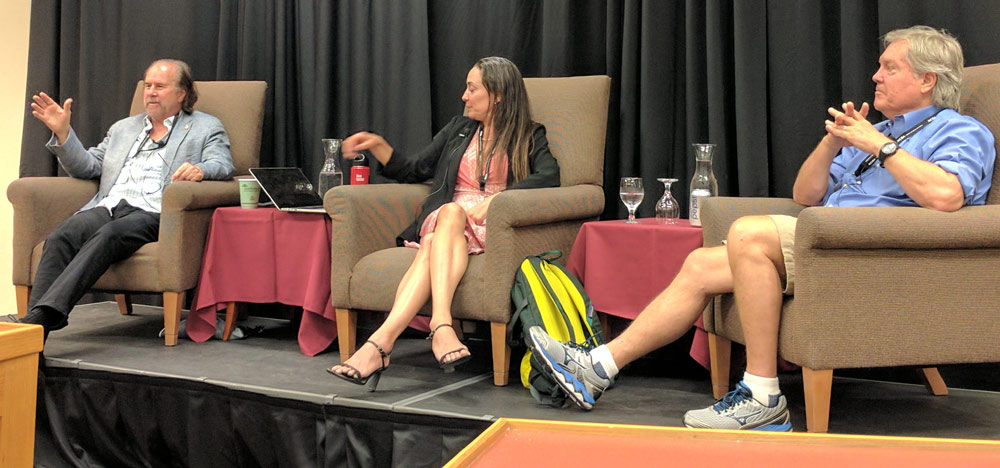Cannabis consumption is a critical issue in legalized states, particularly tourist-heavy Nevada. It proved a hot topic at a law conference in Denver, which will soon launch a new social-use program.
Public consumption of cannabis is the “next frontier” and the next big legal hurdle for Nevada and other legalized states, said Tick Segerblom, a state senator representing Las Vegas.
All eyes are on Denver, as the Mile High City attempts a first-in-the-nation social use regulatory program, Segerblom said on Saturday, the second and final day of the National Cannabis Bar Association’s Cannabis Law Institute on Saturday at the University of Denver.
“Once this opens up, I can bring some people from Las Vegas (to Denver) and say, ‘Here, look at this, the sky hasn’t fallen, it works fine, no big deal,’” Segerblom said. “And they can then see, get their eyes to open up and see what a bonanza it could be in Nevada.”
Public consumption was among several topics discussed in the “Emerging Issues in Cannabis Law” discussion with Segerblom and Henry Wykowski, the attorney who represented California dispensary Harborside Health Center in a civil forfeiture case, and moderated by Lara DeCaro, a business attorney specializing in areas such as medical marijuana and intellectual property.
Unraveling questions around social use will be critical to his tourist-heavy state, said Segerblom, an attorney and Democratic legislator who authored Nevada’s medical marijuana law and served as the co-chair of the successful recreational marijuana initiative. Nevada started allowing adult-use cannabis sales on July 1.
“We have 40 million tourists in Las Vegas; we’re around the world right now saying, ‘Come to Las Vegas, because you can buy recreational marijuana, or cannabis,” he said. “But you have to also say, ‘There is literally no place that you can use this as a tourist.’ You can’t use it in your hotel room. You can’t use it on the Strip. You can’t use it at a restaurant. You can’t use it at a concert. But they do.”
As regulators and attorneys in legalized states navigate the logistics of social use and cannabis operations in general, they should be acutely aware of existing regulations such as indoor-air acts and California’s Proposition 65, which resulted in posted warnings to consumers about the presence of toxic chemicals, said Wykowski.
“I think that the cannabis industry is well behind the curve on (Prop. 65); because in dealing with the bulk of other problems we’ve had to address, this one sort of slipped through the cracks,” Wykowski said. “And some people are now trying to exploit that by going after cannabis dispensaries that don’t have warning signs up that smoke causes cancer — actually, I think it’s just tobacco smoke causes cancer — but cannabis is included in the regulations.”
Wykowski warned of additional risks to both the cannabis industry and the ancillary businesses that serve and support the industry, including moves for asset forfeiture by federal agents or even prosecutions brought against attorneys who represent cannabis businesses.
“I think it’s important that whenever something like this happens to any one of us, that we all have to stand together and back up that person. Because this is the way it starts. They go after one, and if one falls, then they go after another, and another falls. We have to make the fight right at the beginning, not give in. We know what we’re doing, we’re doing it right. And we should let them know we’re not going to let them tolerate attacks on the profession.”
The wide-ranging discussion touched on issues including public-private research supported by the industry; a need for published law review articles; and the roles state-based insurance companies could play in state medical marijuana systems.
But the time for further action on legalization is now — because consumers aren’t waiting, Segerblom said. In Las Vegas, the flip side of not having a place to use cannabis is that “everybody and their uncle” has an idea of where social use of marijuana could take place.
Some of the concepts proposed include 420-friendly hotels, a “Little Amsterdam” street, bed and breakfasts, consumption tour buses, even a marijuana wedding chapel, he said. In reality, cannabis is likely already being consumed in the federally regulated casinos, where people are vaping, he said.
“That dichotomy between what people are trying to stop, and what is actually happening is pretty insane,” he said.

Via: The Cannabist
